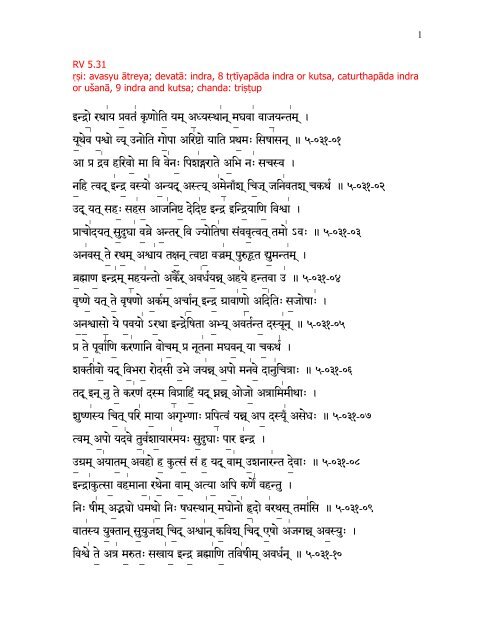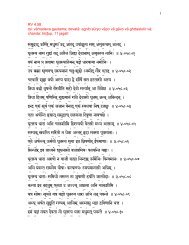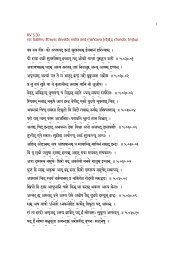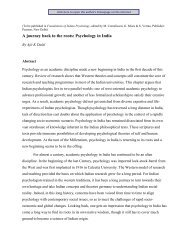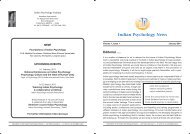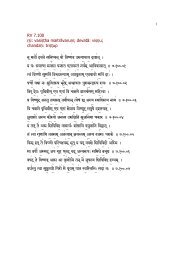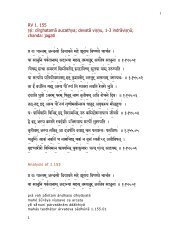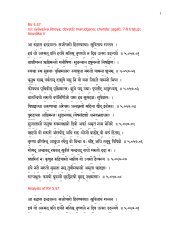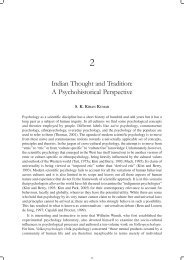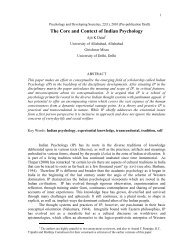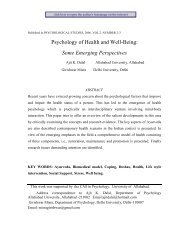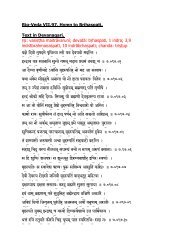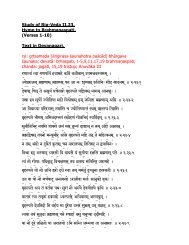Rig Veda 5.31
Rig Veda 5.31
Rig Veda 5.31
You also want an ePaper? Increase the reach of your titles
YUMPU automatically turns print PDFs into web optimized ePapers that Google loves.
1<br />
RV <strong>5.31</strong><br />
ṛṣi: avasyu ātreya; devatā: indra, 8 tṛtīyapāda indra or kutsa, caturthapāda indra<br />
or ušanā, 9 indra and kutsa; chanda: triṣṭup<br />
#NÔae/ rwa?y à/vt ;/xSwa?n! m/"aenae? ù/dae v?rw/s! tma
2<br />
sUr?z! ic/d! rw/m! pir?tKMyaya/m! pUv¡? kr/d! %p?r< jUju/va~s?m! ,<br />
-r?c! c/³m! @t?z>/ s< ir?[ait pu/rae dx?t! sin:yit/ ³tu
3<br />
pravat, f. the side or slope of a mountain, elevation, height RV. AV.; heavenly height (7 or 3 in<br />
number) ib., (pravatonapāt, ‘son of the heavenly height’ i.e. Agni AV.); a sloping path, smooth or<br />
swift course (instr. sg. or pl. ‘downhill, precipitately, swiftly’) RV. TUp.; (pra-vat) mfn. directed<br />
forwards or towards, blazing forth (said of Agni) TS. AitBr.<br />
u, 5. P. unoti (see vy-u RV. v , 31 , 1); 2. A. (1. sg. uve RV. x , 86 , 7); 1. A. avate Dhātup. to<br />
call to, hail, to roar, bellow (see also ota = ā-uta).<br />
Aa à Ô?v hirvae/ ma iv ve?n>/ ipz?¼rate A/i- n>? scSv ,<br />
n/ih Tvd! #?NÔ/ vSyae? A/Nyd! ASTy! A?me/na~z! ic/j! jin?vtz! ckwR . 5-031-02<br />
ā́ prá drava harivo mā́ ví venaḥ píśaṅgarāte abhí naḥ sacasva<br />
nahí tvád indra vásyo anyád ásti amenā́ṃś cij jánivataś cakartha 5.031.02<br />
2. Forward race, O master of thy shining steeds! Let not thy delight turn away from<br />
us, O thou of the golden prosperity; cleave unto us! There is nought in the world<br />
more rich in substance than thou, O God-in-Mind; even to our life-powers, steeds<br />
that have no mate, thou givest a mother for their offspring.<br />
Interpretation:<br />
“Towards us you run fulfilling us (ā pra drava), and not bypassing (mā vi), O Vena, O<br />
Golden Realisation! Cleave unto us! None is here richer than you in the substantial<br />
embodiment, O Indra! You made us, who were powerless accompanied by power of<br />
realisation (=widowers married again)!”<br />
The symbol of marriage was seen as a symbol of realisation in the manifestation:<br />
children are to be born (the souls have to come down into material plane) and taught<br />
the <strong>Veda</strong> (the meaning of this embodiment is the Sacrifice) and carry forward the code<br />
of the evolution of consciousness in the body and in the soul. This could be achieved<br />
only by marriage of the soul with its nature, consciousness and power (=being) must<br />
come together.<br />
Vocabulary:<br />
vena, mf(ī)n. yearning, longing, eager, anxious, loving RV.; m. longing, desire, wish, care ib.; =<br />
yajña Naigh. iii , 17; N. of a divine being of the middle region Naigh. v , 4 Nir. x , 38 (also<br />
applied to Indra, the Sun, Prajā-pati, and a Gandharva; in AitBr. i , 20 connected with the navel);<br />
of a Rājarshi or royal Rishi (father of Prithu, and said to have perished through irreligious conduct<br />
and want of submissiveness to the Brahmans ; he is represented as having occasioned confusion<br />
of castes see Mn. vii , 41 ; ix , 66 ; 67 , and as founder of the race of Nishādas and Dhivaras ;<br />
according to the Vishnu-Purana, Vena was a son of Anga and a descendant of the first Manu; a<br />
Vena Rāja-šravas is enumerated among the <strong>Veda</strong>-vyāsas or arrangers of the <strong>Veda</strong>) MBh. Hariv.<br />
Pur.; (ā) f. love, desire RV.<br />
vasya, mfn. to be put on.<br />
vasya mfn. = vasīyas, better, more excellent or glorious, wealthier or richer than (abl.) RV. VS.<br />
TBr. TUp.; n. increasing wealth or prosperity , welfare RV. AV.<br />
amena, m. having no wife , a widower RV. v , 31 , 2.<br />
janivat, mfn. having a wife RV.
4<br />
%d! yt! sh>/ sh?s/ Aaj?inò/ deid?ò/ #NÔ? #iNÔ/yai[/ ivña? ,<br />
àacae?dyt! su/Ê"a? v/ìe A/Ntr! iv Jyaeit?;a s . 5-031-03<br />
úd yát sáhaḥ sáhasa ā́janiṣṭa dédiṣṭa índra indriyā́ṇi víśvā<br />
prā́codayat sudúghā vavré antár ví jyótiṣā saṃvavr̥tvát támo 'vaḥ 5.031.03<br />
3. When by force he arose and was born as force, God-in-Mind gave his direction to<br />
all his powers; the good milkers that were shut up in their prison he goaded forth<br />
and he opened out by the Light the enveloping darkness.<br />
Interpretation:<br />
“When out of His force He was born as the Force then He has directed totally all his<br />
powers! He impelled the ones to move out, who have the perfect knowledge and are<br />
veiled by the covering darkness! It is by the light that He opened the Darkness covering<br />
All!”<br />
Indra is born as the Force by His own Force. To be born, jan, means to come to<br />
manifestation, to enter the lower hemisphere, and thus to uncover the darkness. This<br />
process of being born by the Force as a Force we can compare with the ‘irruption of<br />
time’ in Gebserian terms. The Time as a subjective creative force irrupts breaking the<br />
resistance of the three-dimensional spatial perceptions of the rational and conceptual<br />
mind, bringing all other dimensions of itself into play: indriyāṇi višvā, all the subjective<br />
psychic and universal dimensions of force, manifesting Time in its full intensity.<br />
Vocabulary:<br />
diš, teach, communicate, tell, inform confess Buddh.; Desid. didikṣati, -te, to wish to show &c.;<br />
Intens. dediṣṭe, 3. pl. -šate, (p. f. pl. -šatīs) to show, exhibit, manifest RV.; to order, command<br />
ib.: Pass. dedišyate, to show or approve one's self. AV. VS.<br />
vavra, mfn. (fr. vṛ) hiding or concealing one's self RV.; m. ‘hiding-place’, a cavern, hole, cave ib.<br />
An?vs! te/ rw/m! Aña?y t]/n! Tvòa/ v¿?m! puéøt *u/mNt?m! ,<br />
ä/üa[/ #NÔ?m! m/hy?Ntae A/k‰Rr! Av?xRy/Ú! Ah?ye/ hNt/va %? . 5-031-04<br />
ánavas te rátham áśvāya takṣan tváṣṭā vájram puruhūta dyumántam<br />
brahmā́ṇa índram maháyanto arkaír ávardhayann áhaye hántavā́ u 5.031.04<br />
4. Subtle souls of men fashioned a chariot for thy steed, the Framer of things<br />
shaped thy shining thunderbolt, O thou of the manifold calling; the chanters of<br />
the soul-thought greatened the God-Mind by their hymns of illumination,<br />
increased him that he might slay the Python.<br />
Interpretation:
5<br />
“The minute elemental powers of the Maker (the subtle souls of men) fashioned a<br />
chariot for your Horse, running forward! Twashtar has made the lightning for you,<br />
shining with the heavenly lustre, O You, who many call to come!<br />
The chanters of the hymns aspirating in the heart increased the God-Mind by their<br />
flaming mantras, they strengthened Him to kill the Python!”<br />
The Powers of Twashtar created the chariot and Twashtar himself created the Vajra for<br />
Indra, the weapon by which he will destroy the Dasyus. It is noteworthy that such things<br />
like chariot and even weapon to fight are to be made for the God in Mind when he<br />
decides to cross the border and to enter the darkness of the lower hemisphere. In his<br />
own world He does not need them. His Horse though was not created, but the chariot<br />
was made for it and for Indra the Vajra.<br />
The Maruts on the other hand chanting the hymns, rising from the heart of men, from<br />
their soul, the heart-ocean, the psychic entity, increase and strengthen Indra for the<br />
destruction of the coiling Python, narrowing consciousness (ahi).<br />
Vocabulary:<br />
anu/aṇu, mf(vī)n. fine, minute , atomic; m. an atom of matter ‘an atom of time’, the 54, 675,<br />
000th part of a muhurta (of 48 minutes); N. of Siva; f. `the subtle one'; N. of the fingers<br />
preparing the Soma juice RV.; n. (in prosody) the fourth part of a mātrā<br />
v&:[e/ yt! te/ v&;?[ae A/kRm! AcaR/n! #NÔ/ ¢ava?[ae/ Aid?it> s/jae;a>? ,<br />
A/n/ñasae/ ye p/vyae? =r/wa #NÔe?i;ta A/_y! Av?tRNt/ dSyU?n! . 5-031-05<br />
vŕ̥ṣṇe yát te vŕ̥ṣaṇo arkám árcān índra grā́vāṇo áditiḥ sajóṣāḥ<br />
anaśvā́so yé paváyo arathā́ índreṣitā abhy ávartanta dásyūn 5.031.05<br />
5. When to thee, the Bull of the diffusion, the Lords of the diffusion sang the<br />
illumining hymn and the pressing stones chanted it and the Mother Infinite, of<br />
one mind with these, then the wheels that bear no chariot and no horses draw<br />
them but God-in-Mind drives, came rolling against the Destroyers.<br />
Interpretation:<br />
“So when the bulls have chanted their Flaming Hymn to the Bull, Indra, the stones (as<br />
the workers) that press and distil the delight of being for the Divine to enjoy it, and the<br />
Mother Aditi, agreeing happily with them, then the wheels, which already run without a<br />
chariot or horses, is sent by Indra rolling over Dasyus.”<br />
Once the luminous Hymn from the Heart is rising, and the Maruts, the bulls, who distil<br />
the delight from the being like the pressing stones of Soma are in concordance with the<br />
Infinite Consciousness, Aditi, then there is no need anymore in the chariot nor any<br />
horses to carry it, for the wheels run over the dividers, moved by the very presence of<br />
Indra.<br />
In the previous hymn it is said that Indra makes heaven and earth the wheels for the<br />
Maruts to travel. It is like the whole manifestation of Hiranyagarbha becomes one
6<br />
chariot running against the forces of darkness, which is beyond it. The manifestation<br />
itself becomes his chariot against the forces of Inconscient.<br />
à te/ pUvaR?i[/ kr?[ain vaec/m! à nUt?na m"v/n! ya c/kwR? ,<br />
zKtI?vae/ yd! iv/-ra/ raed?sI %/-e jy?Ú! A/pae mn?ve/ danu?icÇa> . 5-031-06<br />
prá te pū́rvāṇi káraṇāni vocam prá nū́tanā maghavan yā́ cakártha<br />
śáktīvo yád vibhárā ródasī ubhé jáyann apó mánave dā́nucitrāḥ 5.031.06<br />
6. Thy former deeds I will speak forth and the new ones that thou hast done, O<br />
Lord of the plenitudes, in that thou, O holder of the Force, bearest in their wide<br />
extension our earth and heavens, conquering for man the waters bright with the<br />
rich distribution of our being.<br />
Interpretation:<br />
“I shall speak of your deeds for the fulfilment (pra), O Lord of plenitudes and greatness,<br />
of those of old and of today, O Master of Force, that you uphold heaven and earth,<br />
conquering luminous Waters for Man.”<br />
This idea of upholding or even bearing heaven and earth, vibharā rodasī ubhe, and thus<br />
conquering the waters for men, which thus consist of the luminous consciousness in<br />
their drops, is another image enriching the previous verse of making out of<br />
manifestation a chariot against the forces of division and darkness.<br />
The element of time is also presented here as the deeds of old and of today. The Rishi<br />
wants to bring both of them forward to fulfil their meaning in manifestation. The<br />
complex image of Time as the intensity of creative force can be clearly seen here.<br />
When the two levels overlap: the past deeds and of today, then they are thickened in<br />
their intensity and depth of their presence. This intensity of Force in terms of time is<br />
essential for transformation.<br />
Vocabulary:<br />
šaktīvat, mfn. ‘powerful’ or `helpful' RV. TBr.<br />
šakti, f. power, ability , strength , might , effort , energy , capability, faculty , skill , capacity for ,<br />
power over (gen. loc. dat. , or inf.) RV. &c. &c.; effectiveness or efficacy (of a remedy) ŠarṇgS.;<br />
the energy or active power of a deity personified as his wife and worshipped by the Šākta (q.v.)<br />
‘the relation of a word to the thing designated’ Bhāshāp. Sāh.; (in Gram.) case-power, the idea<br />
conveyed by a case (= kāraka) Pāṇ. 2-3 , 7 Sch.; the power or force or most effective word of a<br />
sacred text or magic formula Up. Pañcar.; the creative power or imagination (of a poet) Kāvyad.;<br />
help, aid, assistance , gift , bestowal RV.; a spear, lance, pike , dart RV. &c.; a sword MW.<br />
(prob.); a flag-staff.<br />
vi-bhṛ P. A. -bharati, -te, to spread out, spread asunder RV. AV.; A. to distribute, diffuse ib.; VS.<br />
to bear, endure MBh.;<br />
dānucitra, mfn. brilliant with dew or moisture RV.
7<br />
td! #n! nu te/ kr?[< dSm iv/àaih ,<br />
zu:[?Sy ic/t! pir? ma/ya A?g&_[a> àip/Tv< yÚ! Ap/ dSyU?~ Asex> . 5-031-07<br />
tád ín nú te káraṇaṃ dasma vipra áhiṃ yád ghnánn ójo átrā́mimīthāḥ<br />
śúṣṇasya cit pári māyā́ agr̥bhṇāḥ prapitváṃ yánn ápa dásyūm̐r asedhaḥ 5.031.07<br />
7. And that too now is thy doing, O achiever of works, O illumined thinker, that<br />
thou, slaying the Serpent, containest here the energy; and thou hast seized on<br />
all the knowings of the evil Strength and hast cloven away the destroyer in thy<br />
forward movement.<br />
Interpretation:<br />
“That is indeed your work, O Skilful Worker, Ecstatic Knower, when you by killing<br />
Python, who narrows our Consciousness and Being, possess his power to be your own.<br />
You’ve taken thus creative force of Darkness, advancing you have separated the Divider<br />
from his creative and formative forces.”<br />
These forces of separation, the Māyās of creative force, shaping the separate being are<br />
now in the hands of Indra, the unifying consciousness-force. One can clearly understand<br />
the utility of the dividers in the evolutionary scheme of things: they were to prepare the<br />
separate being and then it should be taken by the uniting consciousness. The battle is a<br />
natural result. The conquest of the Divine by the Divine within the other is a means of<br />
manifesting the Divine in a separate form.<br />
Vocabulary:<br />
vipra, illumined thinker,<br />
dasma, achiever of works,<br />
prapitva, n. (perhaps for pra-pit-tva fr. pat [682,3] ; cf. apa-pitva) start, flight, haste RV.; the<br />
advanced day i.e. evening ib.<br />
sidh, 1. P. to drive off, scare away , repel , restrain , hinder RV. Kauṣ; to turn out well or<br />
auspiciously ib.<br />
Tvm! A/pae yd?ve tu/vRza/yar?my> su/Ê"a>? pa/r #?NÔ ,<br />
%/¢m! A?yat/m! Av?hae h/ k…Ts . 5-031-08<br />
tuvám apó yádave turváśāya áramayaḥ sudúghāḥ pārá indra<br />
ugrám ayātam ávaho ha kútsaṃ sáṃ ha yád vām uśánā́ranta devā́ḥ 5.031.08<br />
8. Thou madest the waters to play for Yadu and for Turvasu, - kine of a good<br />
milking, - and didst bear them to their other shore. Thou borest on Kutsa,<br />
embracer of knowledge, in his fierce driving against the foe when in ye two<br />
Usahana and the gods rejoiced together.
8<br />
Interpretation:<br />
“You made the lower waters of existence for Aryan peoples Yadu and Turvasu, O Indra,<br />
filled with Milk of perfect knowledge [bringing them thus to] the other shore of creation.<br />
Strongly and fiercely, fulfilling all, you two have come! For you have carried Kutsa with<br />
you, when in you two the gods and Ushana rejoiced.”<br />
The union of the forces of Asuras and Devas working for manifestation of the Divine,<br />
within Indra and Kutsa as his human representative, is very significant here. It was done<br />
before for other peoples of Yadu and Turvasu, when the waters of lower consciousness<br />
were turned by Indra into the milk of supreme knowledge, sudughāḥ, and thus they<br />
were carried to the other shore of creation, pāre, into transcendental realms of<br />
existence.<br />
Vocabulary:<br />
kutsa, m. N. of a Rishi (called Ārjuneya, author of several hymns of the RV. ; when attacked by<br />
the demon Šuṣṇa , Indra defended him and killed the demon; but in other hymns [RV. i , 53 , 10<br />
; ii , 14 , 7 ; iv , 26 , 1 ; viii , 53 , 2] Kutsa is represented as persecuted by Indra) RV. AV.; N. of<br />
a descendant of Angiras (author of the hymns RV. i , 94-98 ; 100-115 ; ix , 97 , 45 seqq.)<br />
ĀšvŠr.; lightning, thunderbolt Naigh. Nir.<br />
kus/kuš, cl. 4. P. kušyati, to embrace, enfold Dhātup. xxvi , 109 (v.l. kus).<br />
ušanas, m. N. of an ancient sage with the patronymic Kāvya RV. AV. iv , 29 , 6 Kauṣ.; (in later<br />
times identified with Šukra, the teacher of the Asuras, who presides over the planet Venus); N.<br />
of the planet Venus MBh. Yājñ. Pañcat. &c.; (ušanasaḥ stoma m. N. of a verse (RV. v , 29 , 9) to<br />
be muttered by one who thinks himself poisoned AšvŠr. v , 9 , 1.)<br />
#NÔa?k…Tsa/ vh?mana/ rwe/na va/m! ATya/ Aip/ k[ˆR? vhNtu ,<br />
in> ;I?m! A/Ñ(ae xm?wae/ in> ;/xSwa?n! m/"aenae? ù/dae v?rw/s! tma
9<br />
Vocabulary:<br />
sadhastha, mfn. ‘standing together’, present RV. AV. n. ‘place where people stand together’,<br />
place of meeting, any place, spot, abode, home, region, world ib. VS.<br />
vat?Sy yu/Ktan! su/yuj?z! ic/d! Aña?n! k/ivz! ic?d! @/;ae A?jgÚ! Av/Syu> ,<br />
ivñe? te/ AÇ? m/ét>/ soa?y/ #NÔ/ äüa?i[/ tiv?;Im! AvxRn! . 5-031-10<br />
vā́tasya yuktā́n suyújaś cid áśvān kavíś cid eṣó ajagann avasyúḥ<br />
víśve te átra marútaḥ sákhāya índra bráhmāṇi táviṣīm avardhan 5.031.10<br />
10. The horses that the Breath of Life has yoked are yoked well, this Seer, too,<br />
desiring his increase, is in motion upon the path; here all the Thought-gods are<br />
thy companions; and our soul-thoughts, O God, increase thy energy.<br />
Interpretation:<br />
“Of the Vital Plane are these horses perfectly controlled, and the Poet moves on the<br />
Path seeking his increase. And all the Maruts here want to accompany you, O Indra, and<br />
all the rising aspirations from the heart have made your (establishing) Power grow!”<br />
Vocabulary:<br />
eṣa, mfn. gliding, running, hastening RV.; mfn. (fr. 3. iṣ) ifc. seeking ŠBr. Xiii; m. the act of<br />
seeking or going after RV. x , 48 , 9 (eṣa), wish, option RV. i , 180 , 4<br />
sUr?z! ic/d! rw/m! pir?tKMyaya/m! pUv¡? kr/d! %p?r< jUju/va~s?m! ,<br />
-r?c! c/³m! @t?z>/ s< ir?[ait pu/rae dx?t! sin:yit/ ³tu
10<br />
Vocabulary:<br />
rī or ri (cf. li) 9. P., to release, set free, let go RV.; to sever, detach from (abl.) ib.; to yield,<br />
bestow AV.; (A.) to be shattered or dissolved, melt, become fluid, drop, flow RV.<br />
cakra, n. (Ved. rarely m. ; g. ardharcādi ; fr. car? ; 1. kṛ Pāṇ. 6-1 , 12 Kāš.) the wheel (of a<br />
carriage, of the Sun's chariot [RV.] , of Time [i , 164 , 2-48] ; -kraM-car, to drive in a carriage<br />
ŠBr. vi) RV. &c.; a potter's wheel ŠBr. xi Yājñ. iii , 146; (cf. -bhrama &c.) a discus or sharp<br />
circular missile weapon (esp. that of Vishnu) MBh. R. Sušr. Pañcat. BhP.<br />
Aay< j?na Ai-/c]e? jga/meNÔ>/ soa?y< su/tsae?mm! #/CDn! ,<br />
vd/n! ¢avav/ veid?m! iæyate/ ySy? jI/rm! A?Xv/yRv/z! cr?iNt . 5-031-12<br />
ā́yáṃ janā abhicákṣe jagāma índraḥ sákhāyaṃ sutásomam ichán<br />
vádan grā́vā áva védim bhriyāte yásya jīrám adhvaryávaś cáranti 5.031.12<br />
12. Lo, O ye peoples, God-in-Mind has come to us for the vision and desires for his<br />
comrade the man who has pressed out the wine of the ecstasy; the pressing<br />
stone lifts up its voice and is brought towards the altar and there are priests of<br />
the journeying sacrifice who keep its swiftness in action.<br />
Interpretation:<br />
“To us this Indra came to see us here, O creatures born in the material body, desiring<br />
the man who pressed out Soma for him to enjoy the company of the Divine. The<br />
sounding pressing stone was brought upon the Altar, whose swiftness the moving<br />
powers on the Sacrificial Path keep in accordance with the Journey.”<br />
It looks like the production of Soma and the evolutionary growth of being are constantly<br />
related. It is as if the production of the delight of existence and sharing it with the<br />
Divine forces creates the subjective movement of Time in itself, the psychic relevance of<br />
time, as it were.<br />
Vocabulary:<br />
grāvan, m. a stone for pressing out the Soma (originally 2 were used RV. ii , 39 , 1; later on 4 or<br />
5) RV. AV. VS. ŠBr.; a stone or rock MBh., BhP. &c.; a mountain L.; a cloud Naigh. i , 10<br />
jīra, mfn. ( jinv Un2.) quick, speedy, active RV., (Naigh. ii , 15) ;m. quick movement (of the<br />
Soma stones) , v , 31 , 12<br />
ye ca/kn?Nt ca/kn?Nt/ nU te mtaR? Am&t/ mae te A~h/ Aar?n! ,<br />
va/v/iNx yJyU?~ %/t te;u? xe/ý! Aaejae/ jne?;u/ ye;u? te/ Syam? . 5-031-13<br />
yé cākánanta cākánanta nū́ té mártā amr̥ta mó té áṃha ā́ran<br />
vāvandhí yájyūm̐r utá téṣu dhehi ójo jáneṣu yéṣu te siyā́ma 5.031.13<br />
13. They who would desire, now let them desire; but they are mortals, O Immortal!<br />
Let not their march and labour lead them into evil. Take thy delight in the doers
11<br />
of the sacrifice and confirm thy energy in them, the peoples among whom may<br />
we be counted.<br />
Interpretation:<br />
“And those who would aspire [for a higher life] they should aspire now! Mortal are they,<br />
they must not deviate to smallness! [To make that happen] you should partake of your<br />
delight in them, who want to sacrifice and put your Power into them, who are thus born<br />
in this material body here, and may we be among them also counted.”<br />
What is following from this verse is that in order to conduct the sacrifice, which is to<br />
grow from mortal into the immortal state of consciousness and being, Indra must<br />
partake in the being of men of his delight, confirming his Power and Presence in him,<br />
and thus securing his journey from the mortal to the immortal life.<br />
Vocabulary:<br />
van, cl. 8. P. A., (pf. vāvāna, vāvantha, vāṃsva ib.) to like, love, wish, desire RV. AV. ŠBr.; to<br />
gain, acquire, procure (for one's self or others) RV. AV. ŠBr.; to conquer, win, become master of,<br />
possess RV. AV.; to prepare, make ready for, aim at, attack RV.<br />
kan, A1. (Subj. 3. pl. cākananta} and cakananta} RV. i , 169 , 4), to be satisfied with, like, enjoy<br />
(with loc. gen. , or instr.) RV.; to please, be liked or wished for (with gen. of the person) RV. i ,<br />
169 , 4; to strive after , seek , desire , wish (with acc. or dat.) RV.<br />
ā-ṛ 2P. (Subj. 2. sg. -ṛṇos RV. i , 30 , 14 and 15 ; aor. āratām, &c.) to insert, place in RV.; to<br />
excite to bring near, fetch RV.; to come to reach, obtain, fall into (misfortune) RV. ŠBr. AitBr.<br />
&c.; to inflict AitBr.


